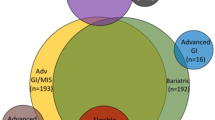Abstract
Introduction
SAGES is responsible for defining educational content for Advanced GI/MIS fellowships administered through the fellowship council (FC). In Fall 2016, to better define core content contained in these fellowships, SAGES proposed new case log criteria including minimum volumes within six defined categories. To test feasibility of these criteria, SAGES conducted a pilot study during the 2017–2018 academic year.
Methods
Advanced GI/MIS fellowship programs directors (PD’s) who also held leadership roles in SAGES were invited to participate in the pilot. Fourteen programs including 17 fellows volunteered. To assess generalizability, 2016–2017 case log data for the volunteered pilot programs were compared to all other advanced GI/MIS programs (n = 92). To assess feasibility of the new criteria, pilot programs’ 2017–2018 case logs were compared to 3 years of historical fellows’ case logs (n = 326). Fisher’s exact test was used for comparisons with p < 0.05 considered significant.
Results
Complete data were available for 16 pilot fellows (median 251.5 advanced MIS cases and 62.5 endoscopies per fellow). According to 2016–2017 data, pilot programs were not statistically different from non-pilot programs regarding achievement of any defined category minimum. Compared to historical controls, the 2017–2018 pilot fellows were significantly more likely to meet the defined category minimum for foregut cases and demonstrated a non-significant trend toward higher achievement of minimums for bariatrics, inguinal hernia, ventral hernia, and endoscopy. Pilot fellows were significantly less likely to meet the minimum for HPB/solid organ/colorectal/thoracic cases. Based on these data, SAGES eliminated the HPB/solid organ/colon/thoracic category and, in partnership with the FC, approved staged implementation of the remaining criteria over 3 years.
Conclusions
The pilot study provided feasibility and generalizability evidence that allowed inclusion of appropriate defined categories for establishment of the new Advance GI/MIS fellowship criteria. We anticipate that the revised criteria will enhance the educational benefit of these fellowships.

Similar content being viewed by others
References
Swanstrom LL, Park A, Arregui M, Franklin M, Smith CD, Blaney C (2006) Bringing order to the chaos: developing a matching process for minimally invasive and gastrointestinal postgraduate fellowships. Ann Surg 243(4):431–435
About the Fellowship Council (2018) https://fellowshipcouncil.org/about/. Accessed 18 April 2018
Fellowship Council Accreditation Guidelines and Definitions (2016) https://fellowshipcouncil.org/wp-content/uploads/2012/02/FC-Accreditation-Guidelines-and-Definitions-4-2016-Web.pdf. Accessed 6 Sept 2017
Weis JJ, Goldblatt M, Pryor A et al (2018) SAGES’s advanced GI/MIS fellowship curriculum pilot project. Surg Endosc 32:2613–2619
SAGES (2018) SAGES fellowship certification application. https://www.sages.org/fellowship-certification/. Accessed 12 March 2018
Park A, Witzke D, Donnelly M (2002) Ongoing deficits in resident training for minimally invasive surgery. J Gastrointest Surg 6(3):501–507 (Discussion 507–509)
Fowler DL, Hogle NJ (2013) The fellowship council: a decade of impact on surgical training. Surg Endosc 27(10):3548–3554
Watanabe Y, Madani A, Bilgic E et al (2017) Don’t fix it if it isn’t broken: a survey of preparedness for practice among graduates of fellowship council-accredited fellowships. Surg Endosc 31(5):2287–2298
Grover BT, Kothari SN (2016) Fellowship training: need and contributions. Surg Clin N Am 96(1):47–57
Park AE, Sutton ER, Heniford BT (2015) Minimally invasive surgery fellowship graduates: their demographics, practice patterns, and contributions. Surgery 158(6):1462–1467
McBride CL, Rosenthal RJ, Brethauer S et al (2017) Constructing a competency-based bariatric surgery fellowship training curriculum. Surg Obes Relat Dis 13(3):437–441
ASMBS (2017) Core curriculum for american society for metabolic and bariatric surgery fellowship training requirements. https://asmbs.org/wp/uploads/2014/05/CoreCurriculumASMBSFellowshipTraining.pdf. Accessed 10 Aug 2017
Englander R, Aschenbrener CA, Flynn T et al (2014) Core entrustable professional activities for entering residency. 2014. https://icollaborative.aamc.org/resource/887/. Accessed 1 Nov 2018
Lomis K, Amiel JM, Ryan MS et al (2017) Implementing an entrustable professional activities framework in undergraduate medical education: early lessons from the AAMC core entrustable professional activities for entering residency pilot. Acad Med 92(6):765–770
Bell RH Jr, Banker MB, Rhodes RS, Biester TW, Lewis FR (2007) Graduate medical education in surgery in the United States. Surg Clin N Am 87(4):811–823 (v–vi)
Jeyarajah DR (2018) President’s welcome. https://fellowshipcouncil.org/front-page-news/presidents-welcome/. Accessed 12 Jun 2018
Acknowledgements
We would like to acknowledge Jason Levine who serves as SAGES webmaster and provided IT support and data retrieval for this project.
Author information
Authors and Affiliations
Corresponding author
Ethics declarations
Disclosures
Drs. Weis, Goldblatt, Pryor, and Scott have no financial disclosures related to the content of this study. Linda Schultz is the Executive Director for the Foundation for Surgical Fellowships.
Additional information
Publisher's Note
Springer Nature remains neutral with regard to jurisdictional claims in published maps and institutional affiliations.
Rights and permissions
About this article
Cite this article
Weis, J.J., Goldblatt, M., Pryor, A. et al. SAGES Advanced GI/MIS fellowship redesign: pilot results and adoption of new standards. Surg Endosc 33, 3056–3061 (2019). https://doi.org/10.1007/s00464-019-06899-4
Received:
Accepted:
Published:
Issue Date:
DOI: https://doi.org/10.1007/s00464-019-06899-4




